Filter by
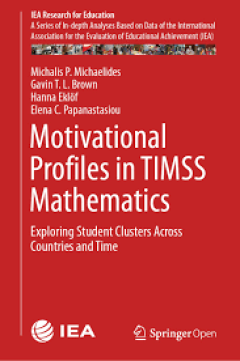
Motivational Profiles in TIMSS Mathematics Exploring Student Clusters Across…
This open access book presents a person-centered exploration of student profiles, using variables related to motivation to do school mathematics derived from the IEA’s Trends in International Mathematics and Science Study (TIMSS) data. Statistical cluster analysis is used to identify groups of students with similar motivational profiles, across grades and over time, for multiple participating…
- Edition
- -
- ISBN/ISSN
- -
- Collation
- -
- Series Title
- -
- Call Number
- -
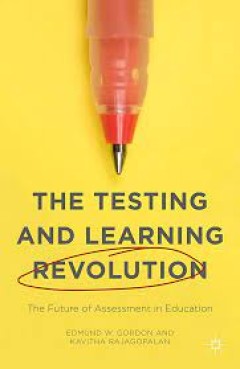
The Testing and Learning Revolution The Future of Assessment in Education
Gordon shows how we can use assessment to support teaching and develop students' competencies. Between 2011 and 2013, Gordon chaired an interdisciplinary commission of scholars and thinkers, who connected transformative research and ideas on learning, teaching, measurement, the nature of tests, intelligence, capability, technology, and policy.
- Edition
- -
- ISBN/ISSN
- 978-1-137-51996-2
- Collation
- -
- Series Title
- -
- Call Number
- -
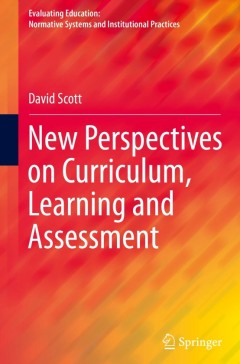
New Perspectives on Curriculum, Learning and Assessment
This book offers a detailed analysis and assessment of the state of education round the world. The argument is made that education and curriculum practices are deficient for two reasons. The first is the adoption by governments, policy-makers and practitioners of a set of knowledge practices that can be broadly characterised as empiricist and technicist, and which has come to dominate how curri…
- Edition
- 1
- ISBN/ISSN
- 978-3-319-22830-3
- Collation
- XIII, 210
- Series Title
- Evaluating Education: Normative Systems and Institutional Practices
- Call Number
- -

Validating Technological Innovation The Introduction and Implementation of O…
This book discusses Hong Kong’s use of onscreen marking (OSM) in public examinations. Given that Hong Kong leads the way in OSM innovation, this book has arisen from a recognised need to provide a comprehensive, coherent account of the findings of various separate but linked validation studies of onscreen public examinations in Hong Kong. The authors discuss their experience of the validation…
- Edition
- -
- ISBN/ISSN
- 978-981-10-0434-6
- Collation
- 51 b/w illustrations
- Series Title
- -
- Call Number
- -

Understanding the Nature of Motivation and Motivating Students through Teachi…
This book is based upon three interrelated open naturalistic studies conducted to better characterise the motivational orientation of students in higher education. Open semi-structured individual interviews were conducted with undergraduates, students at community colleges and students in taught postgraduate courses in Hong Kong. The analysis used an exploratory grounded theory approach and res…
- Edition
- -
- ISBN/ISSN
- 978-981-287-883-0
- Collation
- 4 illustrations in colour
- Series Title
- -
- Call Number
- -
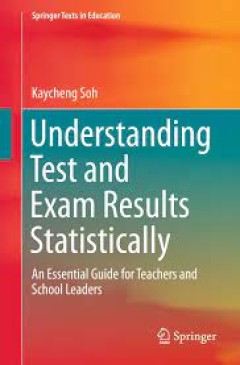
Understanding Test and Exam Results Statistically An Essential Guide for Tea…
This book shares the goal of the classic text How to Lie with Statistics, namely, preventing and correcting statistical misconceptions that are common among practitioners, though its focus is on the educational context. It illustrates and discusses the essentials of educational statistics that will help educational practitioners to do this part of their job properly, i.e., without making concep…
- Edition
- -
- ISBN/ISSN
- 978-981-10-1581-6
- Collation
- 1 b/w illustrations, 10 illustrations in colour
- Series Title
- -
- Call Number
- -
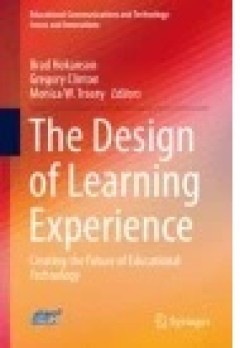
The Design of Learning Experience
This book delves into two divergent, yet parallel themes; first is an examination of how educators can design the experiences of learning, with a focus on the learner and the end results of education; and second, how educators learn to design educational products, processes and experiences. The book seeks to understand how to design how learning occurs, both in the instructional design studio a…
- Edition
- -
- ISBN/ISSN
- 978-3-319-16504-2
- Collation
- XII, 292
- Series Title
- Educational Communications and Technology: Issues and Innovations
- Call Number
- -

Local Drivers for Improvement Capacity: Six Types of School Organisations
This book presents systematically six types of schools, with different improvement capacities. Different schools have different capacities for school improvement, depending on the school infrastructure, norms and routines for the improvement process, improvement roles, and improvement history. The organisation of the improvement capacity is understood on the basis of sensemaking processes among…
- Edition
- -
- ISBN/ISSN
- 978-3-319-12724-8
- Collation
- -
- Series Title
- -
- Call Number
- -
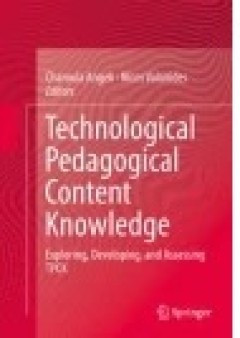
Technological Pedagogical Content Knowledge
Technological pedagogical content knowledge (TPCK) reflects a new direction in understanding the complex interactions among content, pedagogy, learners and technology that can result in successful integration of multiple technologies in teaching and learni
- Edition
- -
- ISBN/ISSN
- 978-1-4899-8080-9
- Collation
- XVII, 331
- Series Title
- -
- Call Number
- -

Teaching And Learning In Lower Secondary Schools In The Era Of Pisa And Timss
This book explores teaching and learning in lower secondary classrooms in the three PISA domains science, mathematics and reading. Based on extensive video documentation from science, math and reading classrooms in Norwegian secondary schooling, it analyzes how offered and experienced teaching and learning opportunities in these three subject areas support students’ learning. The in-depth inv…
- Edition
- -
- ISBN/ISSN
- 978-3-319-17302-3
- Collation
- VI, 193
- Series Title
- Professional Learning and Development in Schools and Higher Education
- Call Number
- -
 Computer Science, Information & General Works
Computer Science, Information & General Works  Philosophy & Psychology
Philosophy & Psychology  Religion
Religion  Social Sciences
Social Sciences  Language
Language  Pure Science
Pure Science  Applied Sciences
Applied Sciences  Art & Recreation
Art & Recreation  Literature
Literature  History & Geography
History & Geography